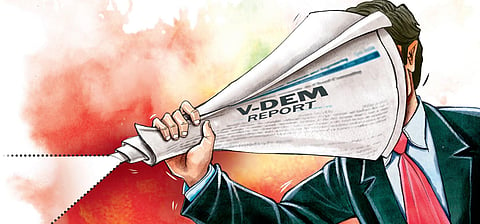Time to challenge this false narrative
The Swedish agency V-Dem, attached to the University of Gothenburg that produces a democracy report every year, has once again downgraded India in its 2021 report. According to this institution, India was an “electoral democracy” in 2010 and it has now turned into an “electoral autocracy”. This report makes some sweeping accusations against India. It questions the integrity of the electoral system in the country and says “freedom and fairness of elections was hard hit” when the Lok Sabha election was held in 2019, leading to downgrading of the country to an electoral autocracy.
This institute now says India is as autocratic as Pakistan, even though it is an Islamic Republic that constitutionally bars non-Muslims from holding the office of president and prime minister. Further, this report says India is worse than Bangladesh, which has Islam as the state religion.The most objectionable part of this report is the question it has raised about the integrity of elections in India, with specific reference to the 2019 Lok Sabha election. Every Indian who values the country’s Constitution and electoral history must condemn this conclusion because of the following reasons: one, this institute presumes that India is run by one party; two, that other parties do not matter.
This is totally absurd because as many as 44 political parties are in power in 31 states and Union territories in the country, excluding the BJP. Parties like the Trinamool Congress (TMC), the Telangana Rashtra Samithi (TRS), the Biju Janata Dal (BJD) and the YSR Congress in Andhra Pradesh won a majority of the seats in their states in that election in 2019. The TMC and the BJD won 22 Lok Sabha seats each while the DMK picked up 23 and the TRS got 9.
Further, after Narendra Modi became the prime minister in 2014, the Aam Aadmi Party (AAP) won 67 of the 70 seats in the Delhi Assembly, the Marxists won in Kerala, Mamata Bannerjee’s TMC registered a massive victory in West Bengal and the Congress won the state Assembly elections convincingly in Rajasthan and Chhattisgarh, to name just a few of the states that voted against the BJP. Therefore, when someone questions the integrity of our election system, Indians must question the integrity of the institutions that are saying this.
Strangely, the V-Dem report claims that “freedom of association” is another thing that is slipping out of the hands of Indian citizens. The Freedom House Report on “Freedom in the World 2021” is also singing a similar tune. It says political rights and civil liberties are eroding in India. How can dozens of political parties, including Muslim parties that are opposed to the ruling BJP at the Centre, win handsome seats in state Assemblies and in Parliament if political rights are curbed? If you need further proof of how false this claim is, please visit the Ghazipur border near Delhi, where our farmers are asserting their political rights and civil liberties, and have blocked a major national highway for several months.This year too, as in 2020, nations such as Denmark, Sweden and Norway are on top of the democracy index of V-Dem. So, the time has come to study the constitutions of these nations and see how they compare with India.
The Constitution of Denmark says the Evangelical Lutheran Church “shall be the established Church of Denmark” and supported by the state. Sweden’s constitution ordains that the King shall always profess the pure evangelical faith and the prince or princess would need government permission to marry! Norway’s constitution says the King “shall at all times profess the Evangelical-Lutheran Religion”.
On the other hand, India, which has civilisationally been a secular nation and even has secularism embedded in the Preamble of its Constitution, is hardly a democracy according to this agency and is placed at number 97.Apart from secularism, separation of religion and state and equality before law are all absent in the constitutions of these three nations. Also, they are not republics like India where the head of state is elected.
You can imagine the absurdity of the rating by this organisation when you find Maldives placed way ahead of India. The Constitution of Maldives says only a Muslim can be a citizen of that country. So, here again, there is no separation of religion and state (in fact, the state is wedded to religion) and there is no sign of secularism. Yet, it is supposedly a much better democracy than India!
Having examined the constitutions of nations that are supposedly better democracies than India, this writer is of the view that only those nations that have all the eight fundamentals listed below can be classified as full-fledged democracies. They are: an inviolable commitment to freedom of expression and freedom of conscience; an unambiguous commitment to secularism; separation of religion and state; republican form of government; right to equality before law (as in Article 14 of the Indian Constitution); right to life and personal liberty (as in Article 21 of the Indian Constitution); gender equality; and universal adult suffrage. We have all the eight elements, but many of the so-called “democracies” placed above India in these reports do not.
India is the world’s largest and most vibrant democracy. India is also the most liberal and diverse society in the world. Therefore, the time has come for the citizens to become aware of their own constitutional strengths and treat these reports with the contempt that they deserve!
A Surya Prakash
Former Chairman, Prasar Bharati and Scholar, Democracy Studies
(suryamedia@gmail.com)

